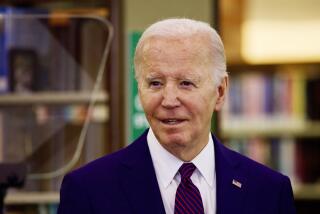Drug Makers Hear Gore’s Remedy
- Share via
DANA POINT — In a private meeting with a dozen biotechnology executives Tuesday, Vice President Al Gore promised that their industry would have direct access to White House policymakers.
The closed-door conference at the Ritz-Carlton hotel in Dana Point followed his speech to about 250 executives and their families at a luncheon in the hotel’s ballroom.
The larger group--known simply as the Biotech Meeting--is a network of top executives who have met annually at the hotel for the last decade.
“The best way to lengthen the average life span of the average American is to lengthen the life span of the average biotech company,” Gore said Tuesday, bringing laughter from the audience.
Gore, a longtime advocate of biotech development, reiterated the Clinton administration’s efforts to make it easier for the industry to bring drugs and therapies to the marketplace.
He noted the administration’s support for legislation intended to remove bureaucratic barriers to approval of safe, effective drugs for sale.
Summing up his expectations for drug research and development, Gore said: “There’s no doubt that biotechnology can become the greatest healing power on Earth in the 21st century.”
After the luncheon, Gore listened as chief executives asked how they might better voice their concerns about federal policies on biotech regulation, research and trade, according to one executive who attended the private meeting.
The private session, which included leaders from Bay Area, Texas and Massachusetts companies and industry group representatives, resembled monthly information-gathering meetings Gore has been holding this year with select Silicon Valley executives.
Political observers have said that Gore is using the meetings as a way to sound out executives in cutting-edge businesses on policy options that could benefit him should he run for the presidency in 2000.
The Silicon Valley group, dubbed “Gore-Tech,” includes Art Levinson, Genentech’s president, and Brook Byers, a partner at Kleiner, Perkins, Caufield and Byers--both of whom attended the Tuesday meeting. Byers and G. Steven Burrill, who runs his own private merchant bank, organized the event.
Afterward, Carl Feldbaum, president of the Biotechnology Industry Organization, a Washington-based trade group, said Gore had promised the group that they could call his chief domestic policy advisor, Don Gips, if they need information on issues involving their industry.
Levinson of Genentech said he appreciated Gore’s detailed grasp of the industry’s issues.
He said executives pressed the vice president to encourage the Food and Drug Administration to permit the marketing of drugs that have been clinically proved to reduce critical markers of disease, such as cancerous tumors, instead of requiring time-consuming proof that the drugs also increase a patient’s life span.
Similarly, executives urged Gore to make sure the Clinton administration names a new FDA commissioner who will continue the agency’s efforts to reduce such regulatory barriers to the marketplace.
They also discussed how the public might be persuaded that lowering barriers will not compromise the agency’s requirement that drugs be proved safe and effective before they’re marketed.
More to Read
Get the L.A. Times Politics newsletter
Deeply reported insights into legislation, politics and policy from Sacramento, Washington and beyond. In your inbox twice per week.
You may occasionally receive promotional content from the Los Angeles Times.










